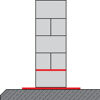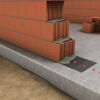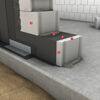With the introduction of the new water impact class W4-E, clear requirements are defined for the structural waterproofing products in and under walls below ground level. For instance, it is specified that the selected waterproofing type must be able to discharge vertical loads without damage and must show adequate shear resistance to horizontal loads. Both requirements can be met by crack-bridging, mineral waterproofing slurries according to DIN 18533.

Capillary moisture in and below walls (W4-E)
As established in Eurocode 6 (DIN EN 1996) since 2012, structural waterproofing that complies with DIN 18533 must now be able to break down vertical and horizontal loads without damage. Based on the shear resistance of the connection between floor plate and raised brickwork, it has been found that crack bridging, mineral sealing mortars are excellent for this area of application.
In order to meet the requirements of the standards and also guarantee a high degree of reliability, Remmers recommends our product MB 2K+. This hybrid product not only demonstrates excellent adhesion bonding to mineral building materials, it is also 3 times as dimensionally stable as the standard requires thanks to the unique rubber granulate filling material technology.
Proof:
- AbP pursuant PG MDS
- Tested of deformation under 3-fold standard load (from DIN EN 15814)
Structural waterproofing on floor slabs
As established in 2012 in Eurocode 6 (DIN EN 1996), structural waterproofing must also be able to remove both vertical and horizontal design loads without damage, in accordance with DIN 18533. Based on the shear resistance of the connection between floor plate and raised brickwork, it has been found that crack bridging, mineral sealing mortars are excellent for this area of application. The combination of the special Kiesol MB primer and the MB 2K mineral sealant perfectly meets this condition and also offers optimum protection against capillary rising moisture.
1 Preliminary work
Remove the adhesion-inhibiting components with a steel brush and sander.
2 Priming
Apply Kiesol MB evenly. Pre-wet heavily absorbent subsurfaces with water.
3 First waterproofing layer
Apply the first waterproofing layer of MB 2K+ evenly as a joint onto the inside to a thickness of approx. 50 mm.
4 Second waterproofing layer
Apply the second waterproofing layer made of MB 2K+ as soon as the first coat can no longer be damaged.
5 Masonry
Brickwork can be installed after the waterproofing barrier has dried sufficiently.

Block waterproofing - special solution with optimum protection
To eliminate moisture during the early stage of the construction phase, we recommend completely waterproofing the first layer of the basement wall. MB 2K+ is exactly the right material. MB 2K+ can not only be used to create structural seals, it can also be used to prevent moisture penetration from the rear. Annoying waiting times or complicated layer structures are therefore a thing of the past.
1 Preliminary work
When stones are used in masonry work, close any openings with brickwork mortar. Chamfer the edges of the brickwork.
2 Priming
Apply Kiesol MB evenly. Pre-wet heavily absorbent subsurfaces with water.
3 First water proofing layer
Apply MB 2K evenly in a grouting method. Completely water proof the first layer of stones and apply the waterproofing to min. 100 mm on the floor slab on both sides.
4 Second water proofing layer
Apply MB 2K as soon as the first coat can no longer be damaged (only stone surface).
5 Second masonry work course
Brick up the water proofing after the above ground wall has dried adequately.

Structural Waterproofing
4 products foundView:
Article No. 417601
Reinforcement fabric made of E-glass with polymer plastic sheathing




